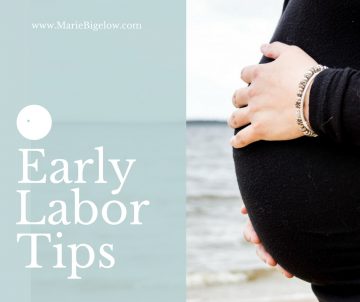Most first time moms wonder what labor will feel like, and wonder how they will know when they are truly in labor. Many of my clients have plenty of questions regarding early labor, so I’ve compiled the ten most frequent questions I receive about early labor with their answers to help you through your early labor.

- What are the first signs that you’re in early labor? It is difficult for most women to know when early labor begins. Some women will notice contractions, but for other women who experienced many Braxton Hicks contractions throughout pregnancy, it will be difficult to pinpoint. Some women experience flu like symptoms like nausea or diarrhea. Others will feel antsy and energized.
- How do you know it’s real and not Braxton Hicks? Time will answer this question. Though Braxton Hicks contractions can be regular, they don’t increase in intensity. Real contractions will become more intense over time, last longer, and will get closer together. It could take hours to know the answer to this question! Braxton Hicks contractions often dissipate with a relaxing bath and by drinking lots of water. If contractions continue to pick up if mom is resting and well hydrated, it is probably early labor.
- How important is it to time contractions? What’s the best way to do this? Focusing too much on contractions during early labor is usually a waste of energy and focus. Contractions can easily be more than 10 minutes apart, and women should continue to function normally as early labor can last for hours, even days. For couples wanting to time contractions, the correct way to do so is to time from the beginning of one contraction to the beginning of the next. So if one contraction begins at 12:00 and the next one begins at 12:13, contractions are 13 minutes apart. About 5% of early labor is spent having contractions, the other 95% is waiting and wondering.
- What are some techniques for handling contractions early on? For the most part, early labor will not be very painful. Moms may feel antsy, and it may be hard to find a comfortable position, but she should not need to actively cope through most of her early labor contractions. Resting in bed, taking a shower or bath, doing yoga, stretching, or taking a short walk can help. Distraction can also help. Games, movies, tidying up, even finishing up the work day can be appropriate activities, depending on the woman. Save the big comfort measures, like massage-deep breathing- and hypnosis for active labor!
- Is it better to rest up or stay active to keep things progressing? Activity should be minimal to preserve energy for active labor. I always remind my clients that you can’t speed up early labor, so there is no point exhausting one’s self by walking 6 miles! Early labor should be a time of resting, hydrating, eating simple-healthy food, and preparing emotionally for active labor. It’s a great time to meditate, or even watch a movie or play a board game. For women who already have children, it’s a good time to connect with older children with snuggles and reading books. Some families enjoy baking cupcakes or a special treat to eat together once the baby is born.
- What should you eat (or not eat?) Food should be healthy, simple, and easy to digest. Steer clear from extreme pregnancy cravings! Many women find fruit to be refreshing. Fruits with lots of water like watermelon and grapes are popular. Simple carbs like toast, crackers, and cereal are nice, too. Many women get upset stomachs during active labor, so foods with onions and garlic can come back to haunt you later on. Staying hydrated is very important. Water is best. Drinks that are high in sugar and stimulants should be avoided.
- What are some last minute things you should throw in the birth bag? To avoid last minute stress, the hospital or birth center bag should be packed before early labor. The only last minute items should be things that you need in daily life (like phone charger, toiletries) or fresh food items. Everything else should already be packed. (clothes for mom and baby, diapers, camera, labor supplies etc) Items that women often forget are chapstick and bobby pins. Labor is hard work, with lots of open mouth breathing. It often leads to dry lips and crazy hair! Some women also like to bring slippers and robes from home.
- When is it time to go to the hospital or birthing center? Most couples head to the hospital or birthing center too soon. Everyone is afraid of not getting there in time, but in reality, most births have more than ample time to get to the correct location. Arriving too early makes labor seem like it is lasting longer, and studies show that women’s perception of pain increases as soon as they leave their homes. As long as the baby is moving and mom is not losing large amounts of blood, couples should stay home until they are well into active labor. This means, having contractions every 5 minutes that last for about 60 seconds, for at least an hour. Contractions should be strong enough that mom cannot function normally through them. She should actively be coping with her labor with deep breathing and other comfort measures like massage and relaxation.
- What are some “do’s” for early labor?
- Do take care of personal needs. Enjoy one more nap, fix your hair/makeup/nails if that makes you feel better.
- Eat and drink.
- Pray/meditate
- Smile! Not only is today the day you have a baby, but smiling releases endorphins.
- Alert your partner/doula/midwife.
- Update Facebook status (kidding!)
- Do make out with your husband (not kidding, it gets those labor hormones going!) Oxytocin, the hormone of love is also the hormone of birth.
- Do take time to clear your mind so you can enter active labor focused, relaxed, and free of stress and distraction. Listen to lullabies, write your baby a letter, or finish up that baby blanket. Thinking about your baby increases oxytocin, which is a vital hormone for childbirth. Focusing on your baby during early labor helps your body and mind come together for a smooth active labor and birth.
- DO TRUST IN YOUR ABILITY TO GIVE BIRTH!
10: What are some “don’ts” for early labor?
- Don’t get hung up on time, early labor is not supposed to be short.
- Don’t alert the world, (unless you want your labor to be interrupted with dozens of texts asking for updates).
- Don’t eat fast food (you will regret it later).
- Don’t go to the hospital during early labor UNLESS your baby isn’t moving, you are bleeding heavily, or your water has broken and it wasn’t clear. (Water that is smelly or dirty is a sign that the baby has already pooped, and your baby will need extra monitoring.)
- Don’t panic. Your body was made to do this!

Presentations by Marie Bigelow, MT, AdvCD(DONA)
- Author-Educator-Advanced Doula-Music Therapist-Maternal/Fetal Health Advocate
- Birth doula, Belly, Binding, and Music Birth Childbirth Educator
- Author of The Sacred Gift of Childbirth: Making Empowered Choices for You and Your Baby
- Founder of Sacred Gifts Birthing

